|
Written By: Kevin White, HESAL Research Associate working on the "Michigan Miners at Home and Work" Project Looking at mining company records can be a much more difficult process than you might think. Often as I am reading the data recorded on employee cards (birthdays, birth place, name, and nationality of family members), it never crossed my mind that some of that data could be wrong. Every now and again I might find addendums that were added to the employee cards, such as an update on the card when a miner gets married, but it is very unusual to see sweeping changes like those found on the employee card of one Kamel Ally. When I initially started working to transcribe this card, I thought that there had perhaps been a miscommunication between the employee and the Calumet & Hecla clerk that had filled out the employment card. It wouldn't be the first time that something like that had happened. However, continuing to read through the card eventually brought to light a situation that was unlike any I had found before. 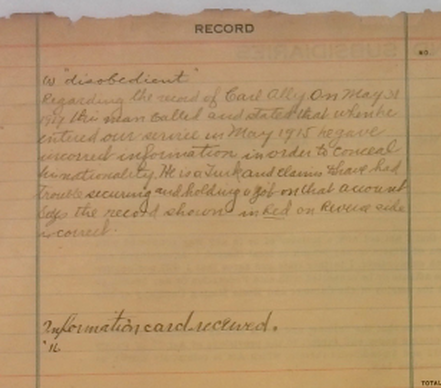 Transcription of Note: "Regarding the record of Carl Ally. On May 31, 1917 the man called and stated that when he entered our service in May 1915 he gave incorrect information in order to conceal his nationality. He is a Turk and claims to have had trouble securing and holding a job on that account. See the record shown in Red on reverse side is correct." Ally had intentionally falsified his information when applying for work at Calumet & Hecla. While this deceit alone made the card stand out from the others, my interest was further compounded when I found the reason he had lied: to achieve equal employment opportunity. At first glance at this information is interesting, and represents an anomaly among many of the other employment cards being reviewed and digitized for the Mapping Miners at Home and Work project, however I learned so much more by taking a deeper look at what this information meant. First off, this card provides compelling evidence of a history of employment discrimination against Turkish people. At the time when he applied for the job, ethnic tensions were high around the world. Discussing the topic with Emily Riippa, one of the archivists at the J. Robert Van Pelt and John and Ruanne Opie Library at Michigan Technological University, she mentioned that at the time Mr. Ally began working with Calumet & Hecla in 1915, World War One was entering its second year of fighting. During 1915, America had yet to enter the war, however the Ottoman Empire (the homeland of the Turks) had allied itself with Germany. While at the time America was not involved in the war, as a nation people had begun to recognize the Germans and other Central Powers (including the Ottoman Empire) as hostile powers. It is quite possible that this was the reason he may have lost his previous job, and as such when he was applying for his position at Calumet & Hecla, he chose to hide this information. However, as the war progressed and America sided with the Allied Powers, hiding the fact that one was from a hostile nation would become riskier. This is compounded by the fact that the copper mines in the Keweenaw were a key asset in America's war-time production. Emily believes that it is quite possible for him to have revealed this information in order to protect himself from being suspected as a spy for the Central Powers. I believe he may have also done it as a sign of good faith toward the higher-ups at Calumet & Hecla. It was mentioned on his employee card that he had previously been dismissed from work due to being "disobedient". While this (like many things on the employee card) is vague, it is quite possible that he had been discharged due to working with union lobbyists or strikers, which were people who would have been seen as disobedient to the higher-ups at C&H. He may have revealed his true national origins alongside agreements to not work with those groups in order to get his job back at C&H, where he ended up working until early 1918. Mr. Ally's employee card gives us just a small glance into what the life of a Turkish immigrant might have been like in the United States. There were many Turkish immigrants who arrived in the country in the early 1900s similar to Mr. Ally, and their stories echo similar discrimination. Many Turks immigrated prior to World War I and adopted Christian names (such as Carl, as opposed to Kamel) in order to try and assimilate into the predominantly Christian America and avoid persecution and discrimination. Many Turkish people also chose to immigrate back out of America after the Republic of Turkey was formed in 1922. But it appears that Mr. Ally decided to stay in America despite discrimination he had suffered in the past, as can be seen by Mr. Ally's participation in the American census (thanks again to Emily for finding that!). It is also worth noting that he did continue to use the name Carl on these later documents, perhaps to assimilate into American life. 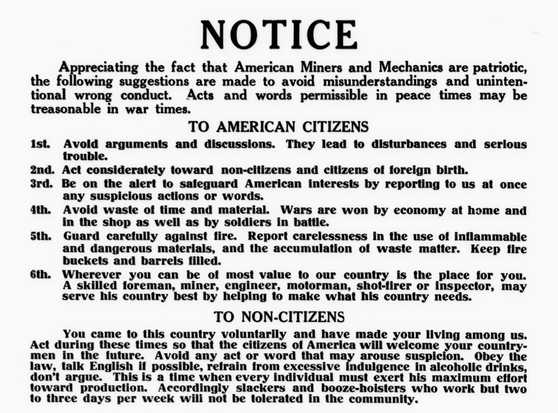 American government and industrial powers bred suspicion and distrust during WWI. The neighboring Quincy Mining Company posted this notice in 1918 printed in six different languages instructing citizens and non-citizens alike to follow orders and avoid the appearance of treason. HAER MICH, 31-HANC, 1-278, Library of Congress Prints and Photographs Division Washington, D.C. 20540 USA https://www.loc.gov/pictures/resource/hhh.mi0086.photos.089087p/ Upon reviewing Mr. Ally's card, another question comes to mind: how many other people falsified their information? It is highly unlikely that Mr. Ally was alone in his scenario, and there were likely additional employees who chose to change their names and nationalities in order to avoid discrimination. Many of those documents may never have been rewritten or marked. It reminds me that data should not just be taken at face value. I am studying computer science as my major, and I am used to dealing with data sets with thousands of entries. But seeing things like this reminds me that every data point has a story and a person behind it. The data we collect from the Mapping Miners at Home and Work project can be used not only to help us create an overarching view of history in the Keweenaw, but also to bring to light the lives of the individuals who made it what it is today.
0 Comments
Recently, James Juip, Senior Research Associate here in the HESA Lab, has undertaken the task of cleaning up the City Directory data that makes up much of the historical records currently available in the Explore App. His work will make it easier to read and understand information about historical people by removing "Null" entries and expanding the shorthand found in the directory to full occupation titles. For example, "lab" was the shorthand used for "laborer", and "clk" was the shorthand for "clerk". These two jobs are among the five most common jobs in the City Directory, along with Miner, Student, and Trammer. In addition to finding and cleaning common jobs, James also found several unusual professions listed in the directories. Some of our favorites include:
Among these unusual professions were also the jobs of Huckster, Clairvoyant, Broom Maker, Traveler, Scissor Grinder, and Sauerkraut Manufacturer. What interesting historical jobs do you know of or can you find in the Keweenaw?
|
|
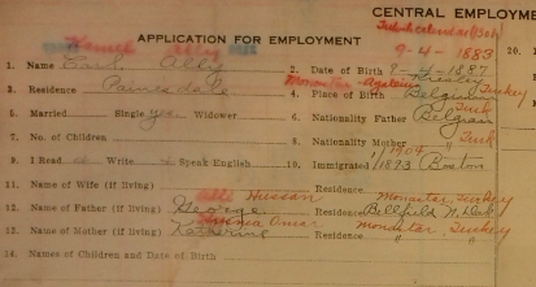
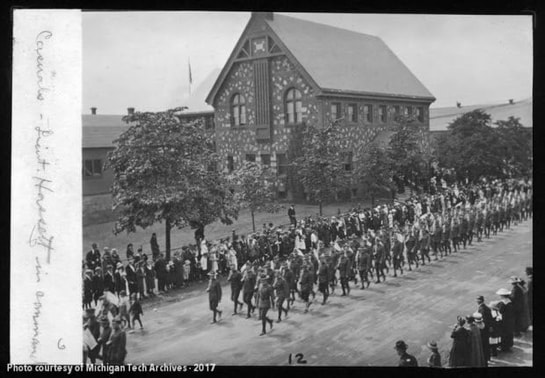



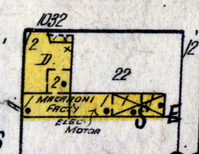
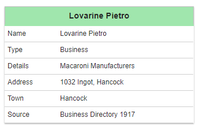



 RSS Feed
RSS Feed



